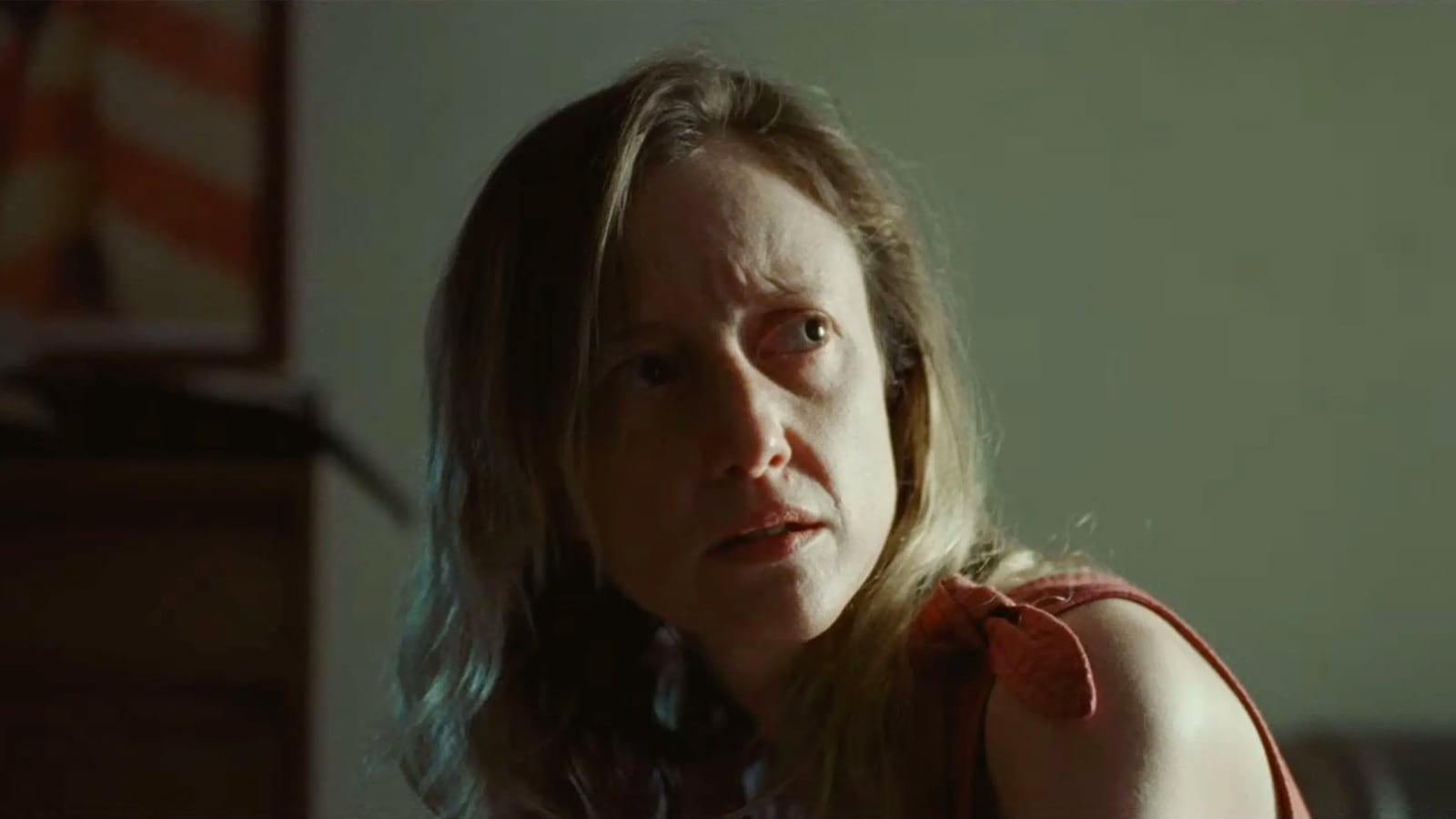The Oscar nominations always bring their share of surprises, but there was perhaps no bigger shock on Tuesday morning than the inclusion of British actress Andrea Riseborough in the Best Actress category for To Leslie.
The little-seen film, which only made less than $28,000 at the box office, suddenly received an influx of support from major stars like Edward Norton and Jane Fonda via social media in the two weeks leading up to the end of nomination voting.
The actress went from being totally absent from the awards conversation, save for an Independent Spirit Awards nomination, to leading it in mere days. Riseborough’s Oscar campaign was seen as a surreal moment of unexpected candor from an actress, a rare moment where someone seemed happy to admit that they wanted to win and would fight for the chance to do so. That it paid off is still baffling.
Some suspected something nefarious about Riseborough’s campaign, the work of someone cutting through the usual routes with ruthless efficiency. Really, what she did was the most streamlined version of what everyone does during awards season, albeit with less money and more texts to famous friends. Indeed, she follows in a surprisingly long history of unconventional Oscar campaigning that has raised eyebrows and inspired many jokes.
Riseborough's campaign is perhaps most reminiscent of the dedicated but small campaign of Carol Kane, who received her only Best Actress nomination for the 1975 Yiddish-language drama Hester Street. As she told Vulture, she became the pet cause of the retired PR guru Max Burkett, who liked to "bet on a dark horse." He would attend Hollywood parties and turn up at the homes of the likes of Frank Sinatra with reels of Hester Street to broadcast after dinner. He knew that the personal touch, plus actually being able to see this tiny indie title, mattered.
But not every kind of attention is good in the Oscar fight. The John Wayne version of The Alamo saw long-time character actor Chill Wills land a nomination for Best Supporting Actor. He hired the infamous publicity agent W.S. ‘Bow-Wow’ Wojciechowicz to run an ad campaign to help him stand out against his impressive competition, which included Sal Mineo and Peter Falk. This involved running For Your Consideration ads in the trades, which included the names of every Academy member alphabetically with a picture of Wills that read, “Win, lose or draw, you’re all my cousins and I love you all.”

Chill Wills
Hulton Archive/Getty ImagesGroucho Marx, who was included in this ad without consent, took out his own response that said, “Dear Mr. Chill Wills: I am delighted to be your cousin but I voted for Sal Mineo.” It got worse when they placed a new ad that featured the cast of the film with the claim that “we of the Alamo cast are praying harder—than the real Texans prayed for their lives in the Alamo—for Chill Wills to win the Oscar as best supporting actor.” This move was seen as so egregious, so in bad taste, that John Wayne himself took out an ad to apologize for it. Wills ended up losing the award to Peter Ustinov.
It's not uncommon for actors to take out their own ads in trades like Variety and The Hollywood Reporter, which reach the largest contingent of industry regulars and Academy voters. Margaret Avery used her own money to pay for a Variety ad to campaign for a nomination for her turn as Shug in The Color Purple, in lieu of purchasing a kitchen stove.

Margaret Avery
Warner Brothers/Getty ImagesThe ad, written in the style of Alice Walker’s novel, said, "God, I guess the time has come fo’ the Academy’s voters to decide whether I is one of the Best Supporting Actresses this year or not! Either way, thank you, LORD, for the opportunity." She was nominated but lost to Anjelica Huston.
For many actors, footing the bill is the only way to get recognition. Ann Dowd, long before she became an Emmy winner for The Handmaid’s Tale, received the best reviews of her career for the bleak drama Compliance. The film never played in more than 21 theaters during its run, and Dowd was paid a mere $100 a day for the role.

Ann Dowd
Dogfish PicturesTo get voters' attention, she maxed out her credit cards and borrowed money from friends (to the tune of around $13,000) to get screeners and ads in front of voters' faces. The film's distributor, Magnolia, said they didn't have the cash to do it for Dowd because Compliance flopped. While she didn't get an Oscar nomination, she did land the National Board of Review’s best supporting actress award and Indie Spirit and Critics Choice Award nominations. It arguably helped to push her into a new level of fame too.
Melissa Leo was mocked for taking out “Consider” ads for her performance in The Fighter that looked like a cross between a Golden Age Hollywood photoshoot and cut scene from Sunset Boulevard. The sticking point, aside from the unexpected grandeur of the ads, was that Leo’s nomination for Best Supporting Actress never seemed to be in doubt. Indeed, she was one of the few guarantees of that season. She certainly got the last laugh when she won the award.

Melissa Leo
Jason Merritt/Getty ImagesPerhaps the most infamous example of one-person thirst in awards campaigning is Sally Kirkland, who seems more well-known for how she got Oscar nominated than the role that landed her the nod. She headlined the little-seen drama Anna, where she played a fading Czechoslovakian actress exiled to America. Because the film was a small, independent production, an awards campaign seemed out of the question, but Kirkland knew this was her chance.
She wrote letters to everyone she knew who was an Academy member, enlisting the help of friends in the promotion of her work. She promoted herself to every journalist available, attended every event, hired two press agents ,and took out trade ads with her own money. She won a Golden Globe for Anna and was nominated for Best Actress, eventually losing to Cher. Kirkland never landed a role as good as Anna after that, and mostly works in indie film and TV, even today. This was the campaign of an unknown actress in her forties who knew the odds but took them on anyway. It's easy to mock that kind of hunger, but who would do things differently if given the chance?

Sally Kirkland
Bob Riha Jr./Getty ImagesAnd plenty of people have taken the chance, even if their studios, colleagues, and agents won’t do it for them. Candy Clark spent $1,700 on trade ads to land a nomination for American Graffiti. Jennifer Tilly created her own campaign for Bullets Over Broadway because the studio was more focused on her co-star Dianne Wiest. Diane Ladd wrote letters to voters and ran an "exhausting" one-woman campaign for Wild at Heart that included cooking spaghetti dinners for Academy members and loaning out VHS copies of the film. Ladd would later take out ads for her daughter, Laura Dern, when she starred in Wild. Not to be outdone in his Dern fandom, David Lynch’s iconic campaign for Inland Empire involved him sitting roadside with a giant Dern poster and a cow.
Oscar campaigns are expensive, labor-intensive, and often extremely messy. At the height of Harvey Weinstein’s power as Miramax and Weinstein Company boss, he was notorious for his full-throated focus on the Academy and his bully tactics. We would host screenings at Academy retirement homes and favored vacation spots for voters, grandly outspend his competitors for ad space, and (allegedly) spread dirty rumors about other films. Everyone tried to out-do Harvey for years, but in the aftermath of his arrest for multiple instances of rape and sexual assault, the campaign wagon has gotten somewhat politer. At least, it’s nicer in theory.
The Oscars are, above all, a popularity contest for rich people. Merit has as much to do with winning the award as the weather on the day of the ceremony. That system, which encourages lavish spending, months of hand-shaking, and wall-to-wall media coverage, only typically works for insiders. It’s much harder to get noticed if you’re not part of the scene, and that scene is, historically, populated by old white men. The Academy has been forced to reckon with its entrenched racism and misogyny for decades now. Progress has happened, but it’s been incremental and often feels like two steps forward, one step back.
This year, two major front-runners for Best Actress, Danielle Deadwyler for Till and Viola Davis for The Woman King, did not make the cut and their films earned zero nominations. Both women had received major precursor awards, earned rapturous reviews, and starred in money-making films that meet many of the stifling requirements for what the Academy considers “Oscar worthy.” But they couldn’t break through that institutional barrier that favors whiteness over all else.
This is partly what angers so many people about Riseborough’s campaign. It was small and cheap and beat the odds but it was still dependent on exploiting the cloistered “I’ll scratch your back, you scratch mine” nature of the industry. We’ve seen this before, like when Ava DuVernay’s Selma landed only two nominations despite being a favorite of that season, or in how Spike Lee couldn’t get nominated for an Oscar until the Academy had already given him an honorary one. Remember, only one Black woman has won Best Actress in 95 years, and no Black woman has ever been nominated for Best Director, even when immense campaigns have been mounted in support of them.
Campaigns like Riseborough’s seldom work, but the brazenness of the tactics behind it have exposed how little the Academy has changed. For all their talk of progress and wanting to embody all that film can be, they’re still a middle-of-the-road organization that plays it safe and doesn’t like outsiders who truly challenge the status quo. The Oscars race could use more campaigns like that of Riseborough, Kirkland, or Dowd, although perhaps it would also benefit the more traditional system to put its money where it counts in terms of talent who aren’t cishet white guys in biopics.
Keep obsessing! Sign up for the Daily Beast’s Obsessed newsletter and follow us on Facebook, Twitter, Instagram and TikTok.






